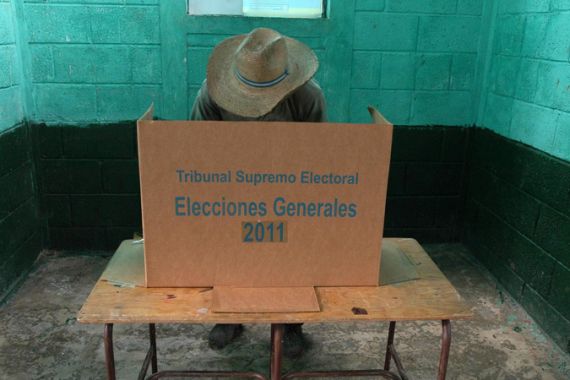Guatemala vote leads to presidential runoff
Retired general Otto Perez Molina receives most support, but fails to win 50 per cent of votes required for victory.

Vote counting in Guatemala’s presidential election has ended with no clear winner, leading to a runoff in November.
Sunday’s election placed Otto Perez Molina, a retired military general with the Patriot Party, in a commanding lead, but he failed to win the 50 per cent of votes required to win.
Preliminary results showed Perez Molina had 36 per cent of voter support, followed by businessman Manuel Baldizon with 24 per cent and Eduardo Suger with 16 per cent.
Each of those condidates lean strongly to the right, and the only leftist running is Nobel Peace Prize laureate and Mayan activist Rigoberta Menchu, who has polled with little more than 2 per cent.
“We have gained a historic advantage,” Perez, 60, told supporters after the tally from Sunday’s election was announced.
“Normally leading candidates are separated by four to six points. We are much farther ahead than that,” he said.
Perez would be the first former military leader elected president in Guatemala after the end of the military dictatorships of the 1970s and ’80s.
A UN-sponsored truth commission found that 200,000 people were killed in Guatemala’s 36-year civil war, 93 per cent of them by state forces and paramilitary groups.
Some 7.3 million Guatemalans were eligible to vote for president and vice president, 158 legislators and hundreds of municipal officials.
Electoral authorities said participation had been “acceptable,” although slower than expected and marred by isolated “incidents”.
Concern over delay
But election observers from the Organisation of American States raised “great concern” about the delay in releasing preliminary results by the Supreme Electoral Tribunal.
Octavio Bordon, the mission’s chief, said it was unclear whether the delays were due to the large volume of votes or poor training of election personnel.
Bordon, while generally satisfied with the conduct of the elections, deplored isolated incidents in which people were brought in from other jurisdictions to vote, roadblocks and vote buying.
In one town, San Miguel Pochuta, residents reacted to the re-election of the town’s mayor by setting fire to the electoral board and part of the city hall, said Erick de Leon, governor of the Chimaltenango department.
“In addition, they looted the police station and destroyed a police car,” he sad.
Improving basic conditions for the more than half of the 14 million people who live in poverty was a major concern. Two million Guatemalans daily suffer from malnutrition and 30 per cent of the population are considered virtually illiterate.
Seventy-five per cent of Guatemalans live in poverty, and the indigenous and rural poor who were most hurt by the war are also bearing the brunt of the current violence.
Violence is epidemic in the nation of 14.7 million people, and organised crime has overrun many regions. Guatemala has a murder rate of 45 per 100,000, according to a World Bank report.